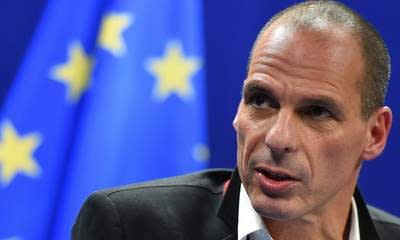Greece Agreement 'Old Deal In New Clothing'

The clue came right at the start of Yanis Varoufakis' press conference.
Up until last night's bailout extension deal , the Greek finance minister spent most of his international media appearances addressing an international audience - speaking fluent, verbose English, taking questions from outlets from around the world.
Last night, in the small Greek briefing room in the Justus Lipsius building in Brussels, he was talking to someone else entirely.
His eyes fixed down the barrel of the cameras, for a quarter of an hour he spoke only in Greek.
"We are now co-authors of our own destiny," he said.
"Negotiation means compromise. But this deal is a small step in the right direction.
"We are no longer following a script given to us by external agencies," he added.
Unusually for him, though, he was reading his speech rather than talking off the cuff.
It did not take a political genius to work out what was going on.
Syriza came to power in Greece last month promising not to do a deal with the shady characters in Brussels.
It promised not to sign up to a continuation of the unpopular bailout programme.
It promised not to have its domestic policies monitored and influenced by the so-called Troika of lenders (the International Monetary Fund, European Commission and European Central Bank).
But the deal it signed up to on Friday night involved, essentially, all of the above.
There were changes in some of the terminology.
The "programme" is now renamed the "contract"; the hated "memorandum of understanding" which entailed the reforms the country needed to make, is called the "Master Financial Assistance Facility Agreement"; the "Troika" is now referred to as "the institutions".
But, for the most part, the bailout extension Greece signed up to looks like precisely the thing Syriza and Varoufakis said they would not agree to.
True, there are some important changes: Greece will be given more leeway on its public finances this year; it will have the opportunity to curtail some of the tougher reforms, such as firesales of assets and changes in pension provisions - though these, too, will have to be approved by the Troika, sorry, institutions, in conversations starting on Monday.
Crucially, Syriza can rightly claim that its government has eased the conditions on the bailout a lot more than its predecessors.
However, this was hardly the revolution in economic policy that many Greeks will have hoped for.
It does not represent a new deal - so much as an old deal in new clothing.
Then again, perhaps that is the best that could have been expected.
This is only a short-term extension to bide the country over.
Without it, there was a distinct chance it would have defaulted and left the euro - the latter of which the vast majority of Greeks are set against.
The country's financial system was looking perilously exposed.
Throughout the Eurogroup meeting, the ECB president Mario Draghi warned repeatedly that unless Greece and its euro counterparts came up with a deal soon, money could start escaping from Greek bank accounts rapidly that there might be a full-blown financial crisis as soon as Monday.
This was a difficult meeting for Mr Varoufakis.
The former academic has taken the political world by storm in recent weeks, carrying out a whistlestop tour of European capitals to explain the Greek position.
However, so visible has he been in this period, so adamant that Greece will not water down its demands, that the events of the past 24 hours may prove tough to contextualise.
What made the job harder still is the fact that he and the finance ministry were marginalised towards the end of the negotiations.
Alexis Tsipras, the Prime Minister, stepped in and carried out some of the talks behind the scenes with his fellow leaders when things looked as if they were breaking down.
After the previous Eurogroup meeting on Monday descended into farce, amid a flood of leaks, the PM insisted that all press communications should be done through his office, rather than Mr Varoufakis'.
It was said that behind-the-scenes, the Germans were refusing to talk to Mr Varoufakis - that some Greek finance officials had been urged to get rid of their boss.
That would be a terrific mistake: their new finance minister is one of the biggest assets Greece has, particularly when it comes to explaining to an international audience why austerity has not worked, and why future deals might have to be different.
And there will almost certainly need to be another deal once these four months have elapsed.
In the meantime, Mr Varoufakis and his colleagues have a tough job on their hands explaining why what was agreed in Brussels was a triumph rather than a defeat.
Their previous feat - overturning decades of two-party domination in Greece - may end up looking easy in comparison.

